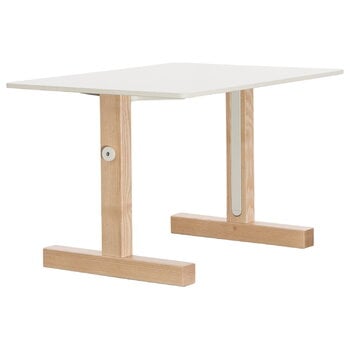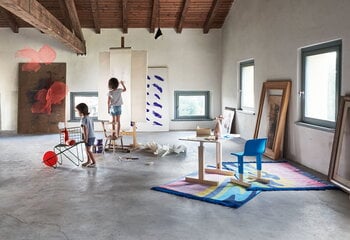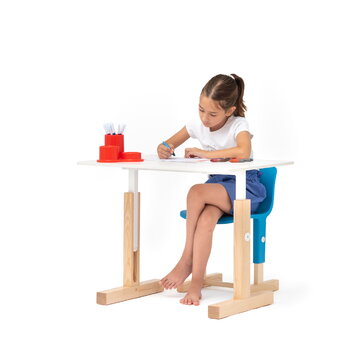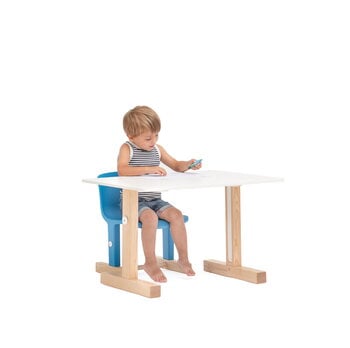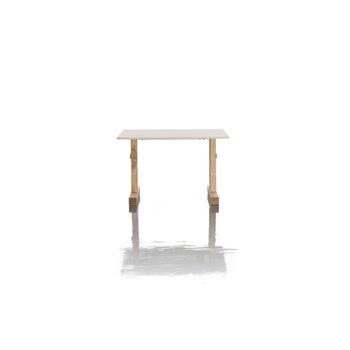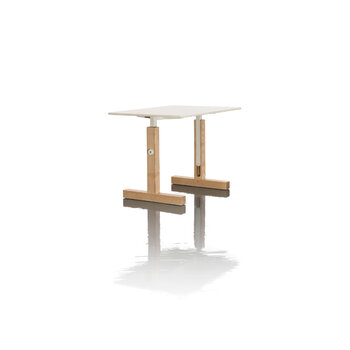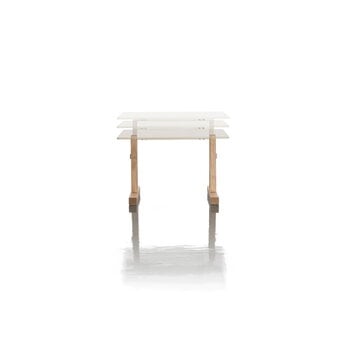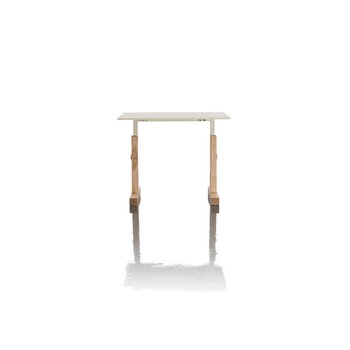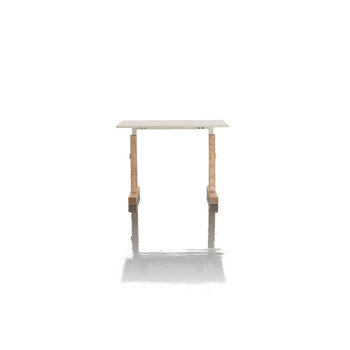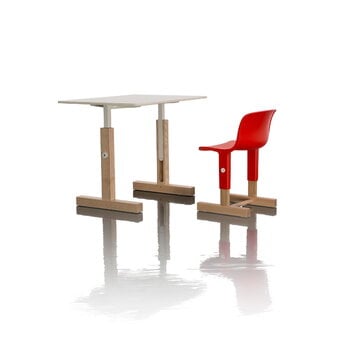The Little Big table by Magis is a multi-purpose table, meant for the family's smallest ones to do homework, colour a colouring book, make art or have a party with friends. As the name suggests, Little Big is designed for smaller and bigger children: the durable but lightweight laminated tabletop is attached to sturdy ash legs, the height of which can be adjusted as the child grows. Little Big is designed by the Swiss design studio BIG-GAME, who wanted to create a multifunctional and durable table – effectively an adult table but in a children's size.
Little Big table, ash - white
Magis
Description
The Little Big table by Magis is a multi-purpose table, meant for the family's smallest ones to do homework, colour a colouring book, make art or have a party with friends. As the name suggests, Little Big is designed for smaller and bigger children: the durable but lightweight laminated tabletop is attached to sturdy ash legs, the height of which can be adjusted as the child grows. Little Big is designed by the Swiss design studio BIG-GAME, who wanted to create a multifunctional and durable table – effectively an adult table but in a children's size.
Product details (8)
- Colour
- White, natural ash
- Width
- 73 cm
- Depth
- 54 cm
- Height
- 46–59 cm
- Measurement details
- Adjustable height 46, 53 or 59 cm
- Table top material
- High-pressure laminate (HPL)
- Frame material
- Steel painted in polyester powder
- Base material
- Solid ash
- Product ID
Designer
The Suisse Grégoire Jeanmonod, the Belgian Elric Petiti and the French Augustin Scott Martinville founded the product and interior design studio BIG-GAME in 2004. The studio is located in Lausanne Switzerland.
The studio describes its style as simple, smart and functional. They have worked together with internationally known clients as Alessi, Hay and Globe-Trotter and their work is visible in many big museums. BIG-GAME has won the Swiss Federal Design Award in 2006 and 2012.
Would you like to read more about BIG-GAME and their work? Discover our books:
BIG-GAME: Everyday Objects
Reviews (0)
Sustainability
The Product Sustainability Framework, our criteria of sustainable design, helps you find the most sustainable products in our selection. Read below which sustainability criteria this product has met.
Working conditions & labour 9/9
-
Equal opportunities for all employees
-
Commitment to UN Global Compact, fair compensation for all employees
-
Corporate responsibility requirements defined and communicated for suppliers
-
Systematic work for improved inclusion and well-being in the workplace
-
Transparent supply chain
-
Suppliers' compliance to a code of conduct ensured
-
Direct suppliers audited and certified
-
Compliance to the UN Guiding Principles on Business and Human Rights ensured in the supply chain
-
Support for community involvement in the supply chain
Eco-friendly production 7/9
-
Fair and resource-wise water-use in production
-
No incineration or landfilling of returned items
-
No use of endangered species as materials
-
No direct environmental emissions or waste (excl. GHGs) from production
-
Material-efficient and ecological packaging
-
Positive impact on nature’s well-being through operations that regenerate natural ecosystems
-
No potentially harmful chemicals used in own production
-
The sustainability of direct suppliers' production is addressed and monitored
-
Production and material sourcing that respect biodiversity, animal rights, and natural ecosystems
Climate impact 5/8
-
Company's direct greenhouse gas emissions identified and commitment to reduction
-
Product's carbon impact identified and commitment to reduction
-
Guidance on energy- and eco-efficient use of the product
-
Contribution to climate initiatives beyond the brand’s direct operations
-
100 % renewable energy in own production and operations
-
Low-carbon or compensated transportation
-
Carbon footprint of the product calculated and goals set to reduce it
-
Carbon neutral or carbon negative product
Sustainable materials 6/6
-
Sustainable and long-lasting material choices
-
No harmful or hazardous substances
-
Responsible raw material sourcing and production
-
Materials suited for circularity: monomaterials, recyclable finishings, renewable or recycled contents etc.
-
Ecological materials: natural, biodegradable, recyclable or recycled contents
-
Outstanding materials in terms of innovativeness, responsibility, sustainability and circularity: local production or sourcing, 100 % recycled content, C2C-certification etc.
Circular design 4/5
-
High aesthetic quality promoting long-term use of the product
-
Technically durable product design and material choices
-
Design for enduring life-long quality
-
Design and support for product maintenance, repair and upgradability
-
Innovative circular design solutions: circular service system, resale platform, remanufacturing, collection of used products, etc.
